Last Wednesday, May 2nd, was a bittersweet day in my SUST 350 Service & Sustainability class at RU. Since March 21st we had convened every Wednesday afternoon at 3pm at the Chicago Lights Urban Farm in the Cabrini-Green neighborhood of Chicago. For our first hour we’d discuss the week’s readings and then have student-led “farm reports” on urban agricultural operations across the US. Then we’d put away our books and grab some tools to work from 4-5:30pm doing whatever farm chores needed doing that day. During this latter part of our class sessions, we labored side by side with several Growing Power staff and the neighborhood teens who work as Youth Corps job interns here during the school year and summer.
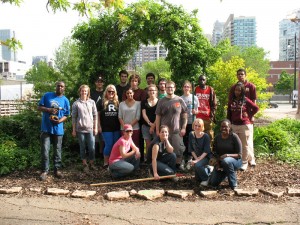
In the process we began to get the rudiments of a working knowledge of the half-acre urban farm here at the corner of Hudson Street and Chicago Avenue in this rapidly gentrifying neighborhood that is still home to many poor and working-class citizens, despite the demolition of most of the Cabrini-Green public housing in the area. (The original Cabrini rowhouses remain just to the north of the farm, though their fate is uncertain.) We learned how to turn over and then utilize compost; appreciated the basic mechanisms of vermicomposting (using worms to break down organic waste and produce nutrient-rich soil consisting of worm castings); mastered the art of handling a power drill; and depended upon the value of teamwork when it comes to weeding, hoeing, raking, shoveling and hauling wood chips, repairing compost bins, and picking up litter.
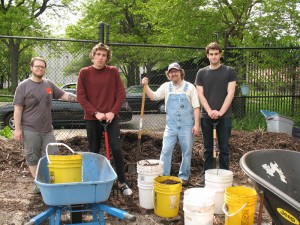
The past couple of weeks, workers at the farm (including us) have been chipping away at a major construction project: a new hoop house to accompany the one now standing near the middle of the farm property.
Last week we made major strides toward that goal, as we helped finish the wooden foundation/frame of the structure and secured it to the ground. Some of us put together lengths of strong but lightweight aluminum poles (itself a simple yet tricky process to get right without injuring a finger), then cut them to length.
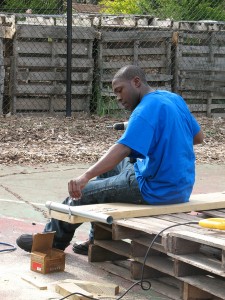
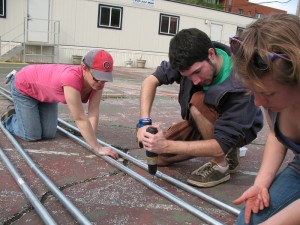
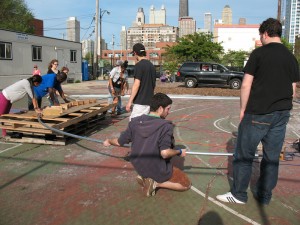
Finally, in the waning minutes of our semester in the late afternoon, we bent two of the poles using a special wooden jig in a well-choreographed ballet of pushing and steadying, and then mounted one of the hoops at the west end of the house. A great cheer went up when this happened, and I felt it a fitting moment on which to conclude our semester: for even as we enjoyed this sense of accomplishment, we knew that the job was far from done. As we said our goodbyes and dispersed in separate directions back to school or home, our Growing Power Youth Corps compatriots at the farm began taking over right where we left off.
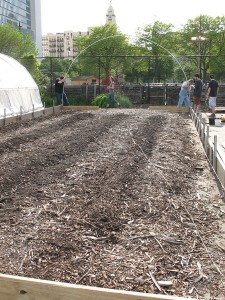
That’s yet another great thing about this service learning experience: it doesn’t end here, even though our spring semester is nearly over. The Chicago Lights Urban Farm welcomes volunteers every Saturday from 10am to 4pm, and I know many of us will return to this friendly and welcoming spot to do some more work with our new friends. As for me, I’m already looking forward to setting up v2 of this course next spring, for it’s the hope of the Sustainability Studies program at Roosevelt to cultivate a long-term relationship with the Chicago Lights and Iron Street urban farms here in the City of Big Shoulders — now one of the great urban agricultural frontiers of North America.
Special thanks go to many people, including:
- Natasha Holbert, director of the Chicago Lights Urban Farm, who was instrumental in the planning for SUST 350, and who provided valuable insights and enthusiastic guidance to us every step of the way;
- Lauralyn Clausen (Education and Curriculum Coordinator and Youth Corps Co-Instructor) Brian Ellis (Youth Corps Co-Instructor), Malcolm Evans (Farm Assistant), and Laurel Simms (Chicago Production/Marketing Manager and Farm Educator) — the Growing Power urban farmers in Chicago who led our daily work sessions, imparted their knowledge, and made us feel welcome from the get-go;
- The Youth Corps job interns (Deja, Henry, Ivory, Jonathan, Kyra, Monique, Quentin, Rayshard, Rayshaun, Sam, and Toni) with whom we worked, joked, and took some cool field trips to Milwaukee and the Chicago River;
- Amy, our phenomenal tour guide at Growing Power’s Milwaukee farm site;
- Erika Allen, director of Growing Power’s Chicago operations across the city and National Outreach Manager, whose visionary leadership is helping make Chicago a greener and healthier city;
- The faculty and staff of Roosevelt University’s Mansfield Institute, who supported this course will a Transformational Service Learning grant;
- And last but not least, my students who were curious enough to sign up for the inaugural section of this class, who worked hard inside and outside of the classroom from Week one through fourteen, and who had no problem handling worms or getting dirty (in fact, I think they rather enjoyed it!)
Here’s to a splendid growing season this summer and a record-breaking harvest next fall!
For an up-close look at our last workday at the farm this spring, check out this online photo album of our last workday (pictures by SUST major Allison Mayes and yours truly).